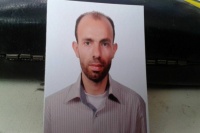Home » Syria » SYR - News » Syria: New Case of Enforced Disappearance After Arrest at Military Checkpoint
On 2 November 2014, Mohamad was travelling with his family from Lebanon to Syria when they were stopped at a checkpoint in the city of Tartus, known as the "Al Areda" checkpoint. Members of the Military Security Branch dressed in military uniforms and civilian clothes forced Mohamed out of his car and arrested him, without presenting an arrest warrant, and took him to an unknown location. When Mohamad's wife enquired about the reasons for his arrest, she was told that he was being detained for "investigation purposes."
Following Mohamad's arrest, his family inquired about his whereabouts in security branches in Damascus and with the Ministry of Justice, which informed the family that Mohamad had been referred to the competent court, without however identifying the court or revealing his whereabouts. Left with no other resort at the national level, Mohamad's family contacted Alkarama and Human Rights Guardians, hoping that these human rights organisations could help shed light on his fate. The organisations then seized the WGEID, asking this UN special procedure on human rights to call upon the Syrian authorities to immediately release Mohamad or, at the very least, to put him under the protection of the law by disclosing his whereabouts and allowing his family to visit him without restriction.
Concerned over the widespread practice of enforced disappearances in Syria, which take place mostly at military checkpoints – as documented by Alkarama on, for example, 22 October 2015, 9 September 2015 and 8 September 2015 – Alkarama calls upon the Syrian authorities to:
- Put an end to the systematic violations of human rights, especially enforced disappearances and torture;
- Prosecute the perpetrators of these crimes; and
- Open investigations into all reported cases of disappearances.
For more information or an interview, please contact the media team at This email address is being protected from spambots. You need JavaScript enabled to view it. (Dir: +41 22 734 1008).
 Algeria
Algeria Bahrain
Bahrain Djibouti
Djibouti Egypt
Egypt Iraq
Iraq Palestine/Israel
Palestine/Israel Jordan
Jordan Kuwait
Kuwait Lebanon
Lebanon Libya
Libya Mauritania
Mauritania Morocco
Morocco Oman
Oman Qatar
Qatar Saudi Arabia
Saudi Arabia Sudan
Sudan Syria
Syria Tunisia
Tunisia United Arab Emirates
United Arab Emirates Yemen
Yemen Other Countries
Other Countries







